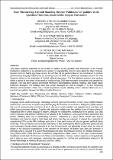| dc.contributor.author | Florence Ngesa Indede, Peter Indichu | |
| dc.contributor.author | BA Ambuyo | |
| dc.date.accessioned | 2020-11-24T10:45:59Z | |
| dc.date.available | 2020-11-24T10:45:59Z | |
| dc.date.issued | 2011 | |
| dc.identifier.uri | https://repository.maseno.ac.ke/handle/123456789/2947 | |
| dc.description.abstract | This paper examines politeness in the context of politics during question time discussions of the Kenyan
Parliament; politeness is an attempt by the speaker to linguistically show he cares about the others feelings.
Question time is a highly aggressive session full of FTAs but the parliamentarians are constrained to produce
parliamentary language required by the standing orders of 2008, thus politeness strategies become the only
linguistic device to the realization of fruitful political discussions. The live televised question time sessions
within a period of two weeks in the month of April and May 2009 were recorded, transcribed and sampled for
analysis. This was done using a theoretical framework encompassing positive, negative, and image repair
politeness strategies. The findings show that certain strategies are used to mitigate FTAs thus enhancing
effective communication; others are a ritual requirement by the standing orders whereas others are as a
result of mere politics between the different political factions. | en_US |
| dc.publisher | International Journal of Humanities ad Social Science | en_US |
| dc.subject | Face Threatening Acts (FTAs), Standing Orders, Politeness, Politics, Mitigation, Members of Parliament (MPs), Effective Communication, Ideological Communication. | en_US |
| dc.title | Face Threatening Acts and Standing Orders:‘Politenedd’or ‘politics’ in the Question Time Discussion of the Kenyan Parliament | en_US |
| dc.type | Article | en_US |

